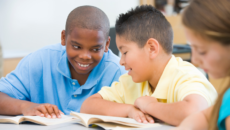As parents, we all do our best to educate friends and family about the joys of adoption. And we make a valiant effort to help the parents of our children’s playmates understand that adoption is just another way a family is made.
As much as we educate, however, neither we nor our children are always prepared when they encounter others who do not understand adoption, or who try to describe it in hurtful ways. While this can occur at any age, the first encounters with mean or inappropriate comments usually come when our children enter school. What is it about kindergarten and first grade?
The “Real Mother” Comment
My daughter, Anna, came home upset from first grade one day. She reported that her classmate, Zachary, had cornered her at recess to say that I was not her real mother. Although Anna responded that he was wrong, he insisted that, because she was adopted, I could not be her real mother.
Anna told her teacher what Zachary had said. Luckily, Anna’s teacher was also an adoptive mom, so she was able to assure Anna that I was indeed real and that I was her mother. Anna’s teacher took the opportunity to use Zachary’s comments to educate the class about adoption.
Anna had grown up knowing she was adopted, that she was born from her birth mother’s womb, and that I had traveled “all over the world” to find my daughter. We had many conversations about adoption, as well as many celebrations of it. Our friends and family included other adoptive families. Still, Zachary’s words confused and hurt my daughter.
A New Reality
Angelina, a seven-year-old girl adopted from Haiti, was thriving in her new home, having developed strong and nurturing relationships with her mother, father, and younger sister, also adopted. One day, however, she returned home from school, sobbing. As her mother comforted her, she learned that Conrad, a fellow first-grader, had told her that her first mother must not have loved her, since she “gave her away.” He also added that her new mom could never love her, either, since her first mom didn’t.
Angelina was devastated. She had never thought about her mother’s love for her—she took it for granted. She, too, had known all about her adoption story and her birth mother. The reasons for her adoption hadn’t occurred to her yet. Conrad’s words brought her face to face with the question, “Why?”
Our children’s experiences at school are beyond our control as parents. When challenging moments come, all of our adoption conversations suddenly seem inadequate.
Words Can Hurt
Why do kids say such things to our children? It’s often due to the developmental stage they are in. Children in the early years of elementary school are just learning about different kinds of families. Until then, they assumed that all families were like their own. But they soon come to realize that there is a larger world out there, and experiences different from their own.
Six- to eight-year-olds are beginning to develop empathy, but hurtful words can emerge from their mouths before they think. In reality, most are not malicious. Of course, not all comments made by children, or even adults, have an innocent intent. Some children intentionally try to hurt. As they begin to notice differences in looks and experiences, some six-to-eight-year-olds deliberately call attention to the shape of someone’s eyes, the texture of their hair, their height, braces, glasses, a birthmark, or a scar.
As difficult as it is to witness our children’s pain, comments such as these are normal. If you can, respond in a way that aims to educate about adoption in the classroom, rather than to accuse. Explain to your child that it is never acceptable to be ridiculed because of physical or other differences. Point out that she never has to answer questions that she doesn’t want to answer. Keep communication open with other parents, so issues can be discussed freely. Remember that all of our children have probably teased a sibling or a classmate themselves at some time, and may need their own lessons in appropriate behavior.
Positive Responses
Teasing and hurtful adoption or ethnic comments can penetrate the core of our children’s identity. How can we support our children and help them maintain healthy self-esteem? How can we stop their hearts from being broken? And how can we mend those broken hearts when they occur?
First, we can listen. Listen to their words, their descriptions of what they experienced, and to their emotional responses. Help them understand that others’ comments and opinions will often not be the same as ours. Explain that sometimes we can educate people or share our feelings, successfully changing people’s minds. Other times, it does not work, but we can hold on to our ideas and beliefs.
We can teach our children positive ways to cope with all kinds of meanness, and we can set examples by using healthy strategies, such as staying calm when negative encounters arise. When children are ready, encourage them to laugh with you later at the ridiculous comments they’ve overheard.
Although we would love to protect our children from all trauma or pain in life, we can’t. In fact, learning to master encounters such as these can help them learn to cope with life’s challenges and to become responsible, healthy, compassionate adults.


